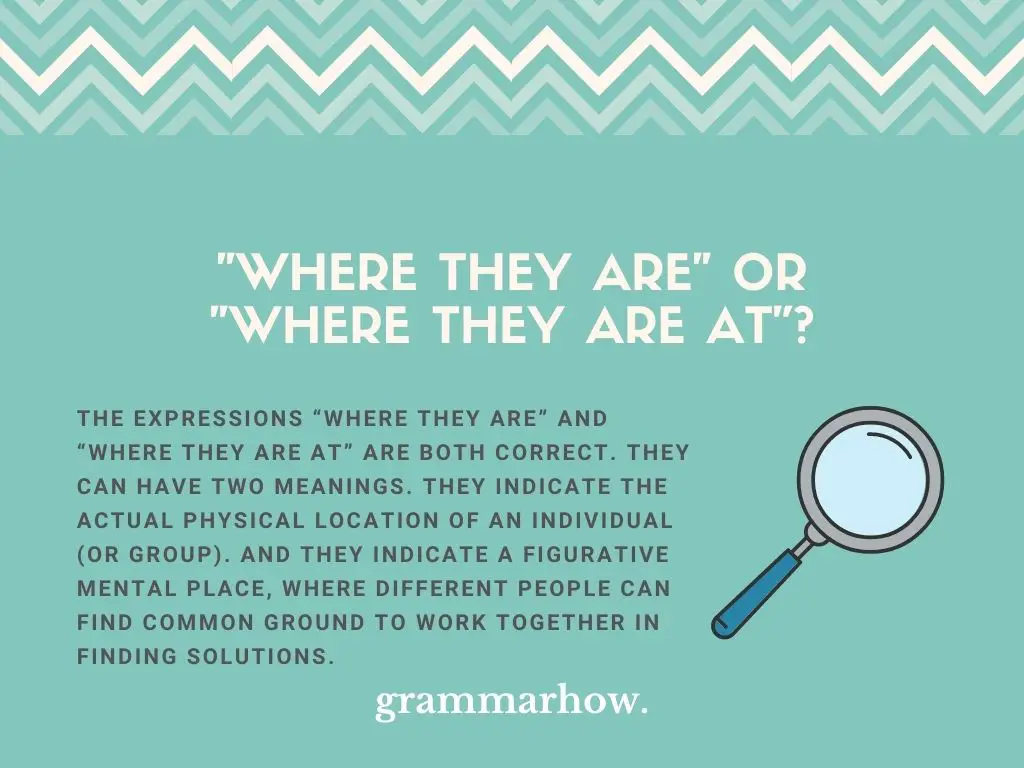Sometimes, while searching for common ground with others, people say they intend to meet them “Where They Are” or “Where They Are At”.
We wonder if both phrases are correct, or if one of them should be avoided. Which would it be? And how to use this expression?
“Where They Are” or “Where They Are At” – Which Is Correct?
The expressions “Where They Are” and “Where They Are At” are both correct. They can have two meanings. They indicate the actual physical location of an individual (or group). And they indicate a figurative mental place, where different people can find common ground to work together in finding solutions.

In both cases, the expressions are synonyms and mean the same thing. Take a look at some examples below:
- Do you know where they are?
- Do you know where they are at?
- I think you should meet John where he’s at mentally, and try to talk things through.
- I think you should meet John where he’s mentally, and try to talk things through.
The first two sentences in the example deal with the literal meaning of the expressions “Where They Are” and “Where They Are At”. It’s a question about some people’s physical, literal location.
The third and fourth sentences present the figurative meaning of the expressions: John and another person are having trouble talking about a topic and the suggestion is to meet John “Where He Is”.
It means to respect the mental place John finds himself at, at the moment, and start the conversation from there, with all of the limitations it might impose on the discussion – but still, without missing out on the opportunity.
Where They Are
“Where They Are” can indicate someone’s physical location, or the emotional, or mental place they are in their lives at the moment. It’s an expression used to describe how people feel and where they find themselves figuratively, as far as their psychological state.
Let’s see some sentences with the phrase “Where They Are”:
- We should just meet them where they are, and start the conversation from there.
- I have no idea where they are, but I can text them.
- Where are they? Candy and Paul should be here by now.
- I hope wherever they are, they’re safe.
- I don’t like the mental space where they are right now, but I think it’s best to give them space.
Sentences 2, 3, and 4 refer to the physical location of the people mentioned in the sentences.
Sentences 1 and 5 discuss people’s mental state, or their state of mind, suggesting that whoever needs to talk or work with them, start by going to them (figuratively speaking) instead of expecting them to stand up and take action.
Where They Are At
“Where They Are At” is just an alternate form to the phrase “Where They Are”. “At” is a preposition that indicates location, but it can be a figurative location as much as a literal one.
Here are some examples:
- Where are they at right now? I can go pick them up.
- I’m not sure where they are at, but I’ll call and ask.
- Carl tries to start therapy by meeting with his patient where they are at, emotionally.
- How can we find out Hank and Joe are at?
- I’m going to call them to find out where they are at.
“Where They Are” and “Where They Are At” – Synonyms
As in most idiomatic expressions, there are many different ways you can convey the same message. If you don’t like “Where They Are” or “Where They Are At”, other phrases exist that will help you deliver your message just the same.
Let’s take a look at some examples:
- Where are you
- Where are you located
- Where they are situated
- Where do you find yourself mentally
- What’s your mental state
Final Thoughts
“Where Are They” and “Where Are They At” are synonyms and can help you convey two different messages. First, you can use them to share someone’s exact location. Second, you can use it to indicate someone’s mental or emotional state, the “place” they are in regards to their mental health.

Martin holds a Master’s degree in Finance and International Business. He has six years of experience in professional communication with clients, executives, and colleagues. Furthermore, he has teaching experience from Aarhus University. Martin has been featured as an expert in communication and teaching on Forbes and Shopify. Read more about Martin here.

